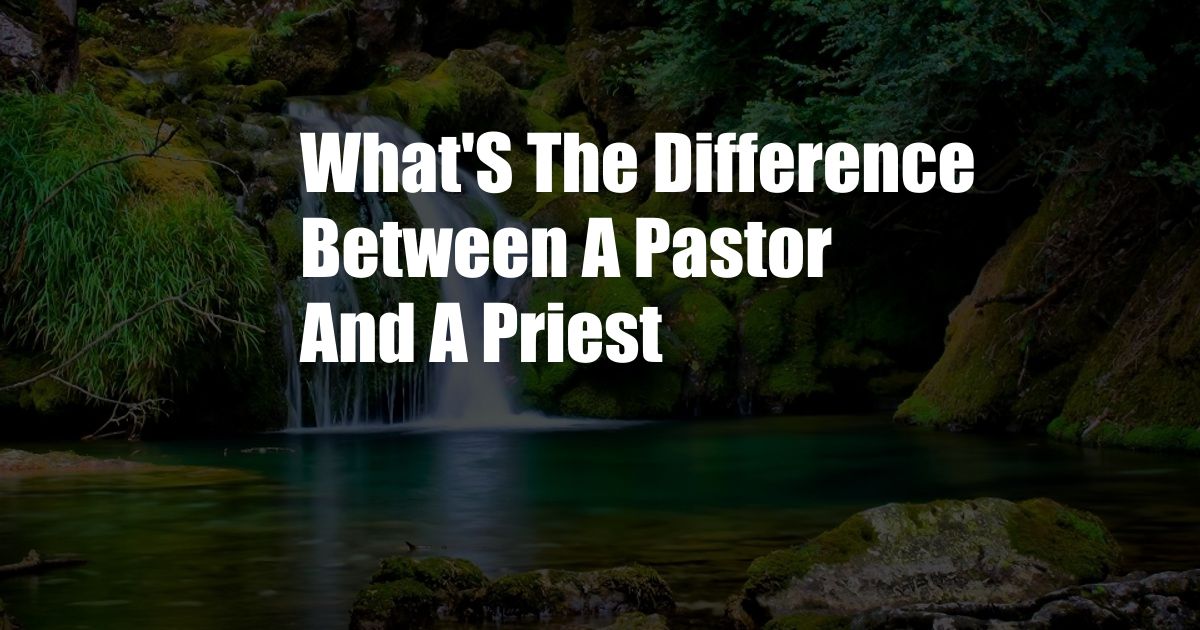
The Ecclesiastical Distinction: Pastor vs. Priest
In the realm of religious leadership, the terms “pastor” and “priest” often evoke images of spiritual guidance and theological authority. However, beneath these commonalities lies a nuanced distinction that shapes their respective roles and responsibilities within Christian denominations.
While both pastors and priests are ordained ministers, their paths to the pulpit diverge significantly. Pastors typically serve as the spiritual leaders of Protestant congregations, emphasizing the direct relationship between the individual and God. In contrast, priests are the ordained ministers of the Catholic Church, acting as intermediaries between the faithful and the divine.
The Protestant Pastor
The Protestant tradition, born from the Reformation, places great emphasis on the authority of scripture and the priesthood of all believers. As such, pastors are often chosen by the congregation and serve as shepherds, guiding their flock through the complexities of Christian life.
Pastors are responsible for preaching sermons, leading worship services, and providing pastoral care to the congregation. Their role is primarily focused on nurturing the spiritual growth of their members and equipping them to live out their faith in their daily lives.
The Catholic Priest
Within the Catholic Church, the role of the priest is sacramental in nature. Priests are ordained through a rigorous process of seminary formation and receive the authority to perform sacraments, such as baptism, Eucharist, and penance.
Catholic priests hold a unique position as intermediaries between God and the people. They are entrusted with the power to administer the sacraments, offer spiritual guidance, and lead the congregation in prayer. Their primary responsibility lies in guiding the faithful through the Catholic tradition and fostering their relationship with Christ.
Education and Formation
The educational and formational paths of pastors and priests differ significantly. Pastors typically hold a bachelor’s degree in theology or a related field and may pursue a Master of Divinity degree. Their education emphasizes biblical studies, theology, and practical ministry skills.
Catholic priests, on the other hand, undergo a rigorous seminary formation that typically spans seven to eight years. It includes a bachelor’s degree in philosophy, followed by a Master of Divinity degree and specialized studies in theology, canon law, and Scripture. The emphasis is on cultivating a deep understanding of the Catholic faith and the sacraments.
Roles and Responsibilities
The roles and responsibilities of pastors and priests vary depending on the specific denomination or parish. However, there are some general distinctions that can be made.
- Pastors: Focus on preaching, teaching, pastoral care, and leading the congregation in worship.
- Priests: Administer the sacraments, offer spiritual guidance, and lead the congregation in prayer.
Conclusion
The distinction between a pastor and a priest reflects the divergent histories, theological emphases, and ecclesiastical structures of Protestant and Catholic Christianity. While both serve as spiritual leaders, their paths to the pulpit, education, roles, and responsibilities differ significantly.
Ultimately, the choice between a pastor and a priest depends on the individual’s faith tradition and spiritual needs.
Are you interested in learning more about this topic?